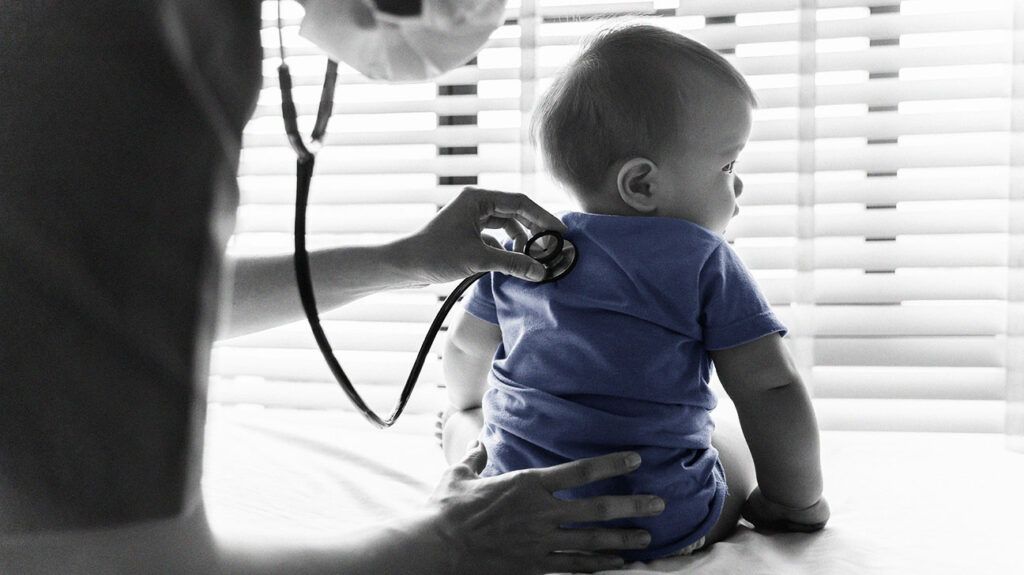Whooping cough and croup are both contagious respiratory infections. Whooping cough causes a high pitched, gasping cough, while croup causes a barking, seal-like cough.
Whooping cough and croup are infections that typically affect babies and young children, although they can also occur in older children or adults.
This article looks at the differences between whooping cough and croup, and their symptoms, diagnosis, and treatment.

Whooping cough is a respiratory infection
Croup is a respiratory infection that
The following table compares the symptoms of whopping cough and croup.
| Whooping cough | Croup |
|---|---|
| Occasional, mild cough, but not in babies, which may progress to coughing fits with a “whooping,” high pitched sound | Barking, seal-like cough |
| Runny or stuffy nose | Hoarse voice |
| Low grade fever, which is | Low grade fever, although not always |
| Vomiting during or after coughing fits | Stridor, which is high pitched or noisy breathing, which may |
| Fatigued during coughing fits with recovering in between | Increased heart rate |
| Difficulty breathing | Apnea, which consists of pauses in breathing |
| Apnea, which are pauses in breathing | Retraction, in which the skin around the ribs and chest area sinks in due to difficulty breathing |
| Cyanosis, which is a bluish or purplish discoloration of the skin | Cyanosis, though rare |
People can contact a doctor if they think they or a child has whooping cough or croup.
People
- struggling to breathe
- blue or purple discoloration of the skin, lips, or nails
- violent coughing or rapid, repeated coughing
- not drinking enough fluids, which may lead to dehydration
To diagnose whopping cough, doctors will assess symptoms and determine whether a person may have been in contact with others who have had whooping cough. They
- a physical exam
- taking a mucus sample from the throat for laboratory testing
- blood tests
To diagnose croup, doctors will usually assess signs and symptoms, as testing
Doctors use the Westley scoring system to grade croup from 0–17, scoring the severity of the following symptoms:
- stridor
- retractions
- cyanosis
- level of consciousness
- air entry
The score shows how mild or severe croup is:
- 2 or less: Mild
- 3–5: Moderate
- 6–11: Severe
- 12 or above: Potential respiratory failure
Severe croup is rare, and over 85% of children with croup score in the mild range.
Doctors
Alongside antibiotics, people can also help manage symptoms at home by:
- minimizing any irritants, such as dust, smoke, or chemical fumes
- using a cool mist humidifier, which can help loosen mucus and ease coughing
- washing the hands regularly with soap and water for a minimum of 20 seconds
- eating smaller meals more frequently to help stop vomiting
- drinking plenty of fluids, such as water, soup, or juices, to help prevent dehydration
People will need to avoid cough medications unless a doctor advises otherwise.
People with severe whooping cough symptoms may require treatment in a hospital. This may include drawing out mucus, intravenous (IV) fluids for dehydration, and oxygen.
Doctors
People with moderate to severe croup may require epinephrine, which they inhale, alongside dexamethasone. If croup is causing breathing difficulties, people may also need supplemental oxygen.
According to the
The CDC recommends vaccination against whooping cough for:
- all babies and children
- pre-teens
- anyone who is pregnant
- adults who have not had the vaccine
The available vaccines in the United States are:
- diphtheria, tetanus, and pertussis (DTaP) vaccine, for anyone under the age of 7 years
- tetanus, diphtheria, and pertussis (Tdap) vaccine, for older children or adults
Good hygiene practices may also help prevent the spread of viruses and bacteria that can cause respiratory infections.
- Use a tissue to cover the mouth and nose when coughing or sneezing, and then throw the tissue away.
- If no tissue is available, cough or sneeze into the elbow or upper arm, rather than the hands.
- Wash the hands regularly for at least 20 seconds, using soap and water.
- If handwashing is not possible, use an alcohol-based hand sanitizer.
- Avoid contact with people who have a respiratory illness, and keep a child away from school until they recover.
This section answers some frequently asked questions about whooping cough and croup.
How do you rule out whooping cough?
According to the American Lung Association, symptoms of whooping cough may seem similar to a common cold in the early stages of the infection.
People may be able to tell the difference between whooping cough and other respiratory illnesses once later symptoms develop.
To rule out whooping cough, doctors may assess symptoms once the infection progresses. They may be able to tell the difference between whooping cough and other conditions by listening to the cough and carrying out a physical exam.
Taking nasal and throat swabs to check for the presence of the B. pertussis bacteria can identify if it is whooping cough or another condition.
How can you tell the difference between a cough and croup?
Croup causes a barking cough, similar to the sound a seal makes.
Croup may also cause additional symptoms, such as difficulty breathing and stridor. In people with more severe cases, it can cause retraction and cyanosis.
Whooping cough and croup are respiratory infections that typically affect babies and young children.
Whooping cough causes a gasping, whooping sound, whereas croup causes a barking cough.
Treatments may include medications and self-care. People with severe cases may require medical care in a hospital.
